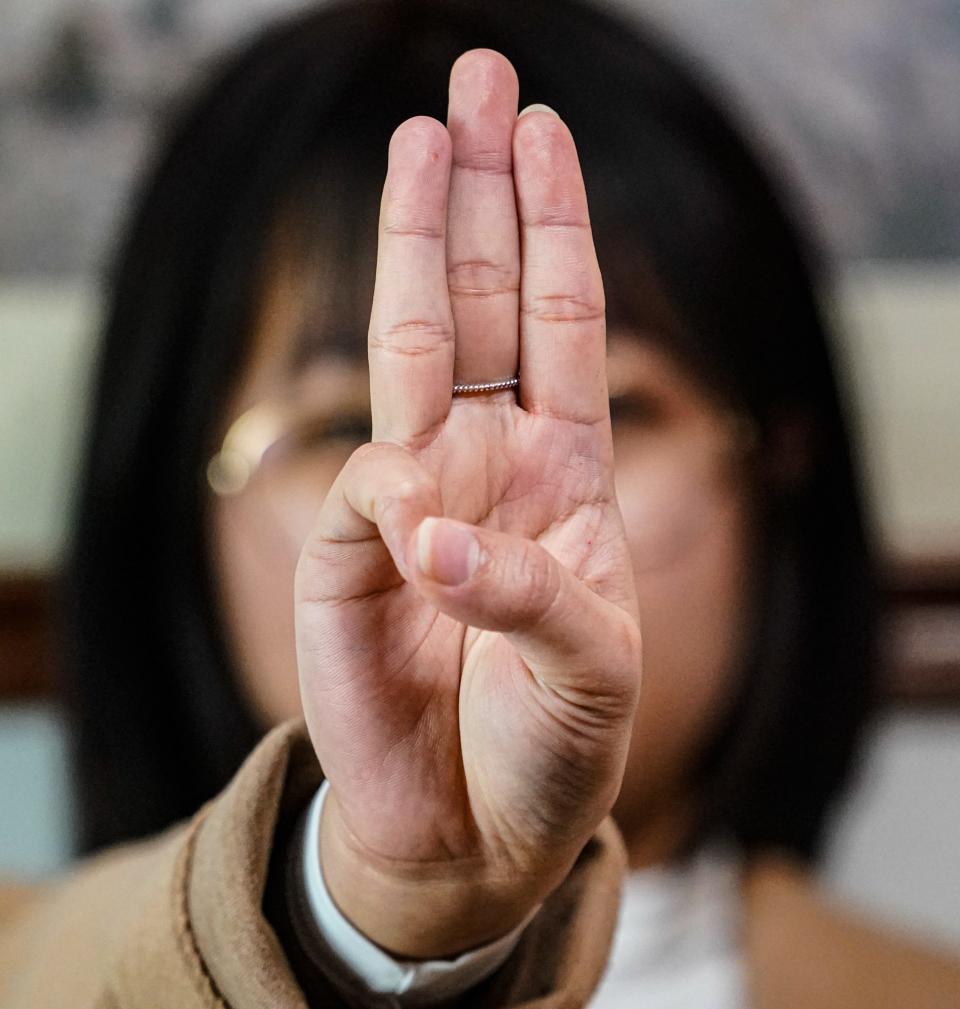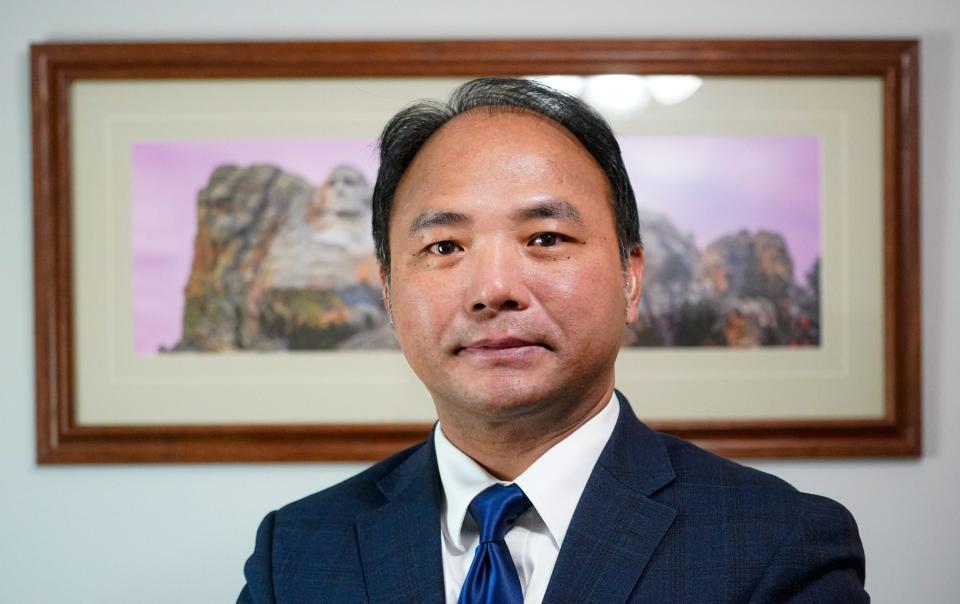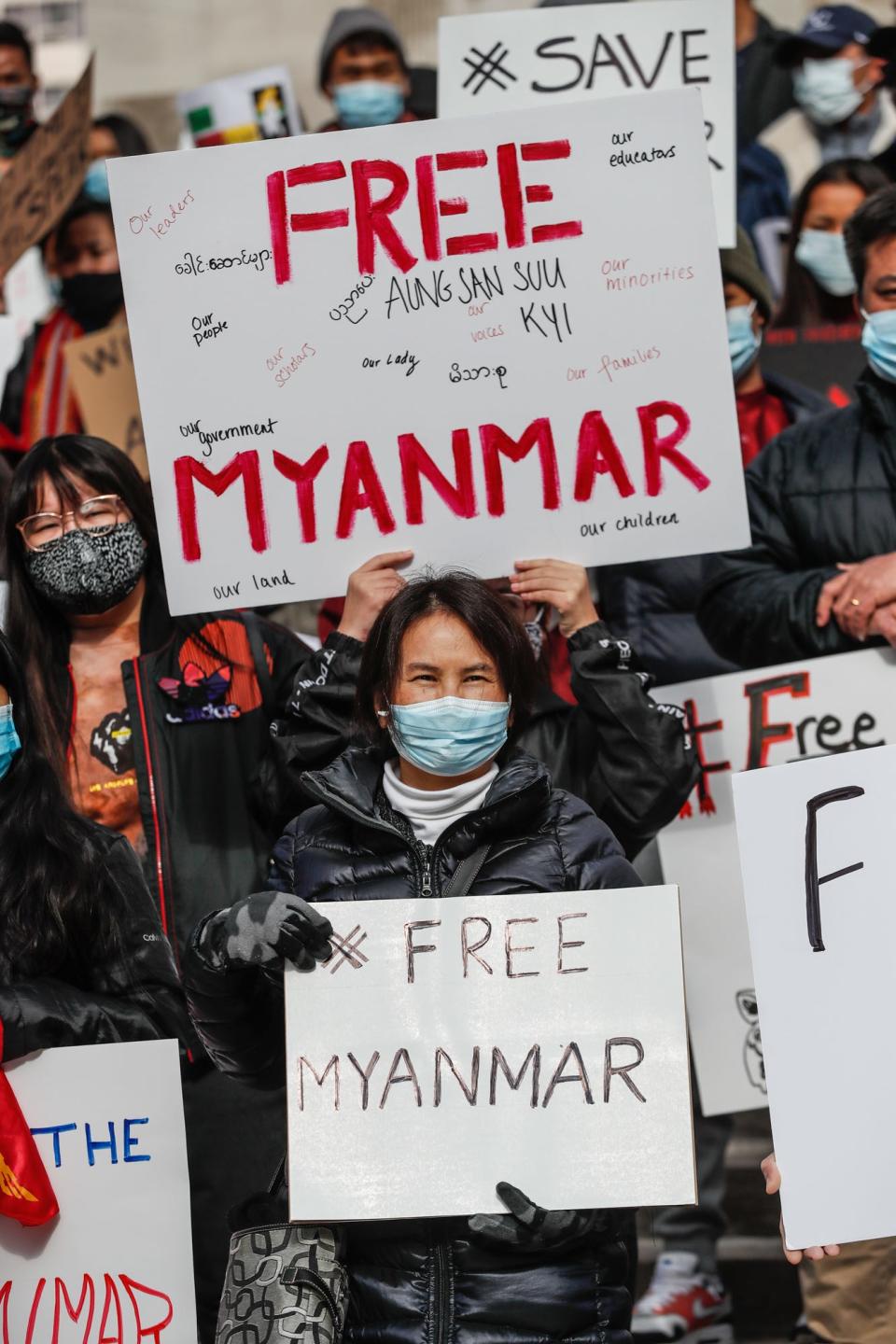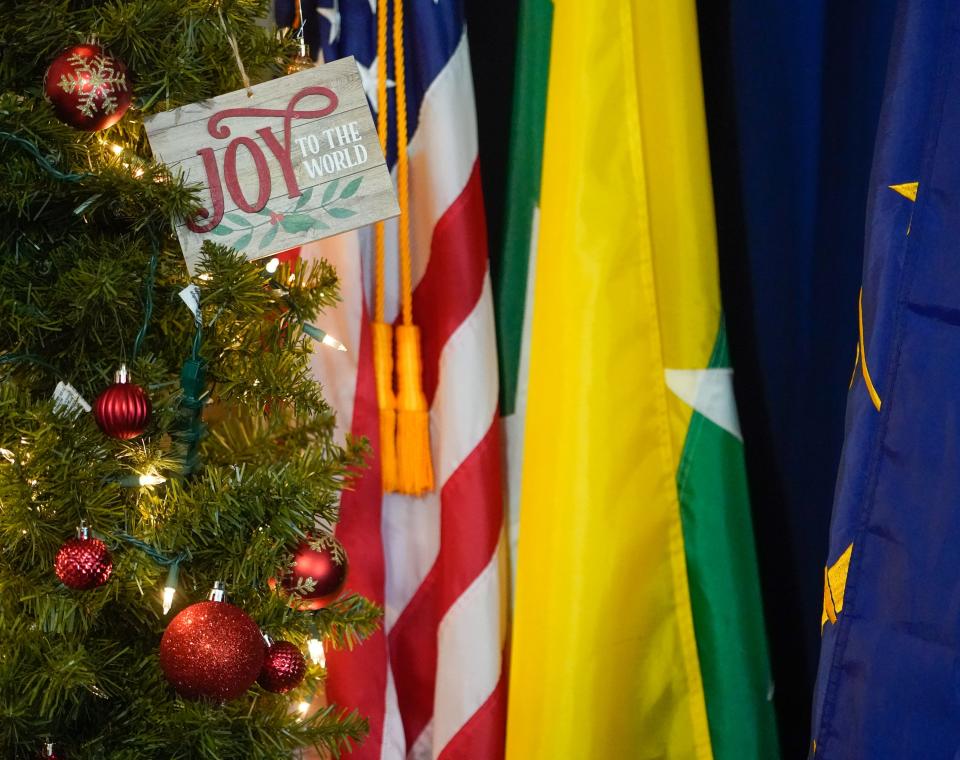Burmese refugees in Indiana closely watching fight to restore democracy in Myanmar
- Oops!Something went wrong.Please try again later.
Ngun Tha Par spends her days helping Burmese refugees find employment as they resettle in Indianapolis. As a case manager for the local nonprofit Burmese American Community Institute, she scours the Internet looking for jobs that suit their skills and preferences, and then submits applications for them.
Back home in Myanmar, the petite and soft-spoken 24-year-old led a very different life.

Ngun Tha Par was a member of the Chin Defense Force, one of the many resistance forces fighting the military junta after it seized control of the government almost three years ago.
The Feb. 1, 2021, military coup d'état against the civilian government led to the ousting and imprisonment of several elected officials, including Aung San Suu Kyi, Myanmar’s democracy icon. The coup, which halted the impoverished Southeast Asian country’s brief and fragile hold on democracy, set off a civilian uprising unseen in more than three decades.
Thousands are estimated to have been killed and even more have been detained since, as the military cracked down on opposition, carrying out hundreds of airstrikes, burning villages, and raiding houses, schools, hospitals and places of worship.
"As we speak now, people are dying," said Elaisa Vahnie, executive director of the Burmese American Community Institute, which helps Burmese refugees resettle in Indiana.
Those displaced within Myanmar are now in the millions. So are the numbers of refugees and asylum seekers who have fled to neighboring nations and countries like the United States in the past two years.
Since the military coup in 2021, nearly 10,000 Burmese refugees have moved to the U.S., according to the Refugee Processing Center, an office under the Department of State. About 860 of those refugees have been resettled in Indiana, which already was home to one of the largest Burmese populations — roughly 40,000 — in the country.
Vahnie estimates the number of those who have resettled in Indiana since the coup is much higher, up to 2,000, because many refugees who were initially resettled in other states ended up finding homes in Indiana. These include hundreds of temporary visa holders who came to the U.S. as visitors and international students, Vahnie said.

Among them is Ngun Tha Par, who moved to the U.S. last year on a student visa.
She misses her friends, her family, her home. But staying, she said, would’ve meant death. Coming to Indianapolis, where she already has relatives and where there are services that help the growing Burmese population, would mean she can continue her studies and find a job to support her family back home.
“Sometimes, I feel like I shouldn’t be here. I should be there with my friends, my families,” said Ngun Tha Par, the eldest of three children. “I think I have guilt because I feel like I escaped from the disaster and the chaos, and they’re there enduring all the sufferings and all the difficulties by themselves. They don’t even know how long they’ll live. It’s very scary.”
‘I just couldn’t stay silent’
Ngun Tha Par was studying zoology in Yangon, Myanmar’s largest city. Her plan was to get her master’s and doctoral degrees, likely in agriculture, so she can help improve farming in her village in Chin State in western Myanmar.
The pandemic disrupted her studies. After the military coup, her plan was completely upended, as the country’s already weak educational institutions collapsed under military rule.
Students, including Ngun Tha Par, took to the streets in Yangon, and teachers and school employees didn’t show up for work to protest. They protested every day, Ngun Tha Par said, holding signs that called for the rejection of the military and raising their hands in a three-finger salute, a sign that originated from “The Hunger Games” and has been adopted by protesters to show their opposition.
There were many times when she almost got caught, she said. While they were protesting sometime in 2021, Ngun Tha Par said the military began shooting at protesters. She recalled taking refuge inside a tiny restaurant, where the owner led her and several others to an attached house and allowed them to hide in a bedroom. For more than three hours, she and more than a dozen others crammed inside that bedroom, crying and waiting until it’s safe to leave.
Her parents were worried, and she couldn’t blame them.

“But I just couldn’t stay silent,” she said.
By early 2022, she decided she needed to do more. She joined the Chin Defense Force, a resistance group in western Myanmar that was created after the coup, and signed on to become a medic even though she's scared of blood.
They were divided in groups and slept in tents made of plastic, Ngun Tha Par said. But it was impossible to sleep, especially at night during the rainy season, when blood-sucking leeches swarmed them. Because she's a medic, she always carried a backpack with medicine and other supplies.
Later, she learned that a close friend, a soldier for the Chin National Army, a bigger and more established resistance group, was killed. His body had been brutalized and nearly unrecognizable by the time it was recovered three days later, Ngun Tha Par said, her voice trembling.
She decided to join the Chin National Army. But reality immediately struck her: She, too, could die at any moment. She thought about her parents, who both have health problems, and still live in their village. She thought of her two younger brothers, who both have also left Myanmar.
"I feel like I need to find a way … This is not the only way to support my people," she said. "If I go to another country, if I earn money, I can support them financially."
She applied as an international student and got accepted at Henry Ford Community College in Dearborn, Mich., just outside of Detroit. She got her student visa after a few months of waiting.
She arrived in the U.S. in the summer of 2022 and lived with family friends in Michigan. Early this year, she moved to Indianapolis to live with relatives and transferred to Ivy Tech Community College.
When she had enough money, she sent some to her family, dividing the modest sum between her parents and two brothers. Once or twice a month, she receives a call from her parents, who always remind her not to worry, to read her Bible and to pray.
“If something happens to us, you have to take care of your brothers,” she said, recalling what her mother told her during their last conversation.
In Myanmar, ‘we can’t really have dreams’

Ngun Tha Par said she and many others didn’t think the military coup would last this long. As the country’s young generation, she said they saw the Internet as their advantage. She figured, if they posted photos and videos of military atrocities, the rest of the world would help them.
But by April 2021, the military had severely restricted Internet access.
And as two major wars — Russia against Ukraine and Israel against Hamas — captured the world’s attention, some believe Myanmar and its people have been abandoned.
“Most of our countrymen think they are forgotten. They have not gotten help and aid from the international community as they deserve,” said a former member of the Burmese parliament under the National League for Democracy, the party co-founded by Aung San Suu Kyi in 1988.
He fled Myanmar under the federal humanitarian parole program, which allows individuals who otherwise can’t come to the U.S. to temporarily stay here for urgent humanitarian reasons. The man, who IndyStar is not naming because of safety concerns, moved to Indianapolis last year.
“The United States government needs to make more efforts to get together with the international community so that democracy and freedom is restored in our country as soon as possible,” he said.
The United States has imposed sanctions on dozens of organizations and individuals, including those linked to the selling of weapons to the Myanmar military. Earlier this month, Tom Andrews, the United Nations’ special rapporteur on human rights in Myanmar, called for immediate measures to stop the flow of weapons to the military junta and to help ground jets and helicopters being used to attack villages, schools, hospitals and camps.
But the conflict has continued to escalate.
In Indianapolis, the Burmese American Community Association has provided food and shelter to those who resettled here since the coup, Vahnie said. It has launched initiatives, including educational programs, for students whose education was disrupted by the pandemic and by the coup.
Vahnie said Hoosiers should care about the plight of the Burmese people because much like the war between Russia and Ukraine, the crisis in Myanmar is a battle between autocracy and democracy.
Ngun Tha Par said she now plans to major in accounting, hoping it’ll afford her a decent living. Sometimes, she regrets leaving as she watches the conflict unfold from thousands of miles away.
Still, she and her parents are thankful for America, her second home.
“They’re happy that I’m safe and sound here, that I have a future, that I can have a dream,” she said. “Back in my country, we can’t really have dreams.”
Contact IndyStar reporter Kristine Phillips at (317) 444-3026 or at kphillips@indystar.com.
This article originally appeared on Indianapolis Star: Burmese refugees in Indiana watching fight for democracy in Myanmar

